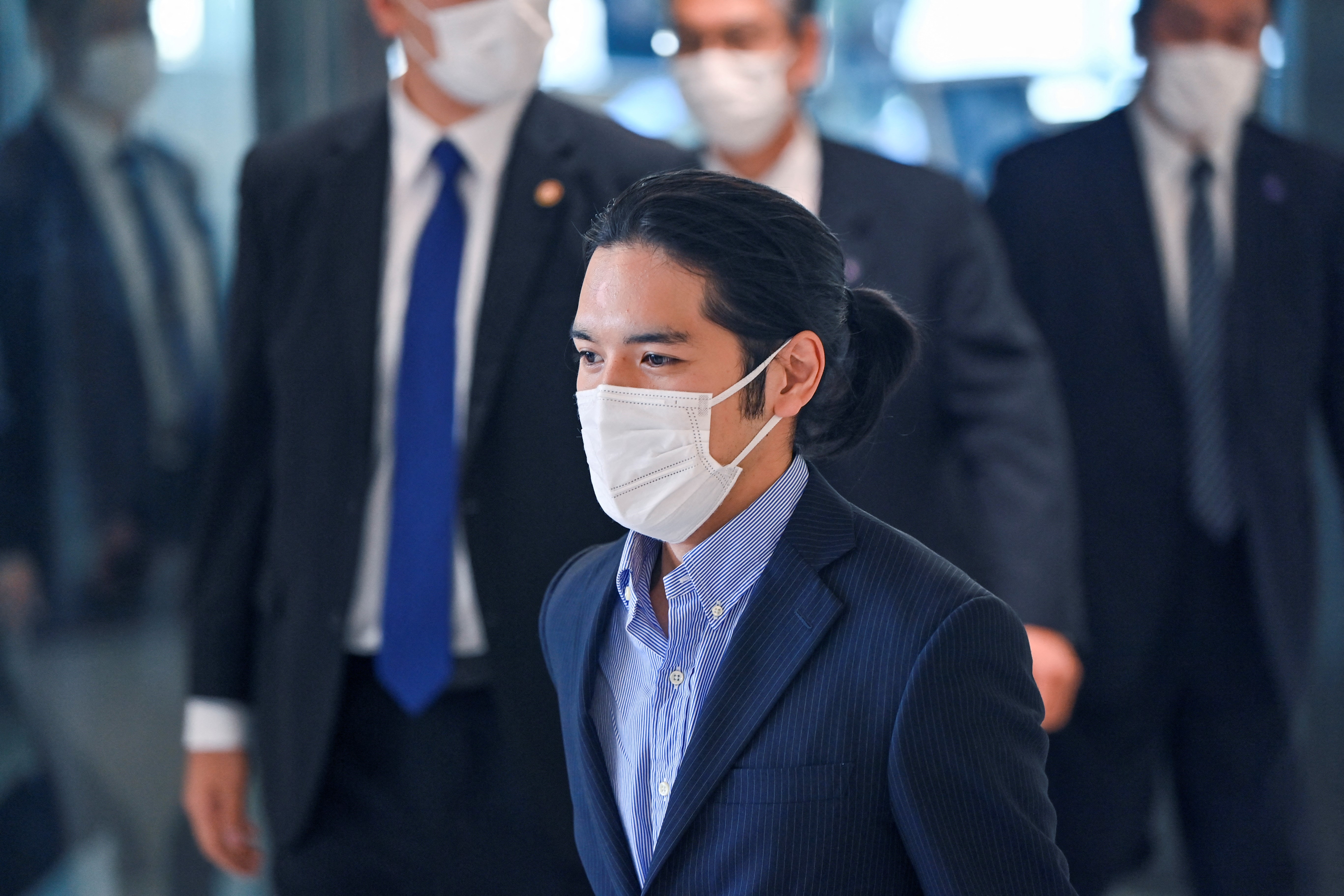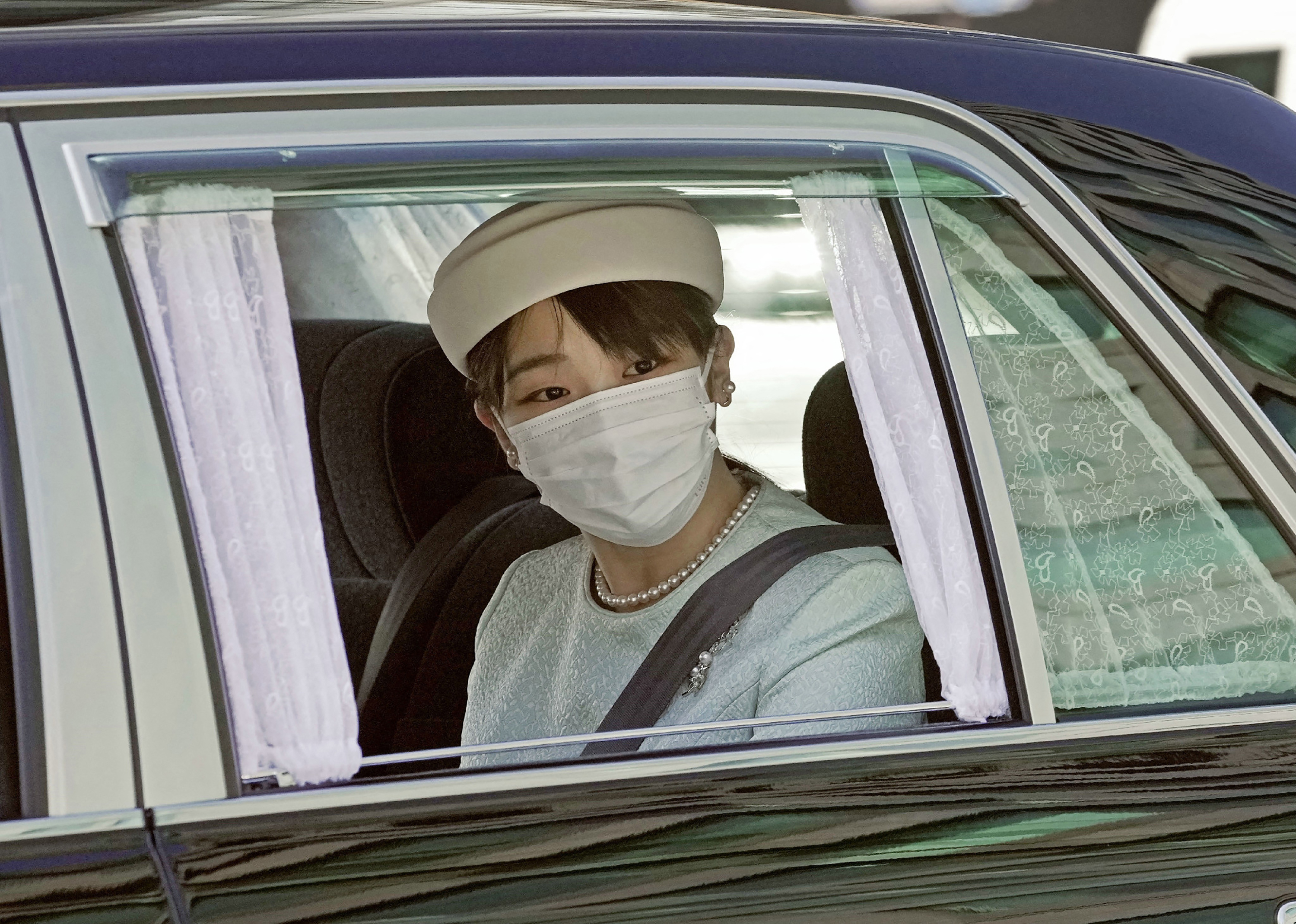Japanese Princess Mako’s Marriage Story Isn’t Just About Love. It’s About Freedom.
It was a mild autumn day four years ago when Japan’s Princess Mako announced her engagement to someone entirely outside her social class.
Sitting next to this man, her college sweetheart Kei Komuro, she described his smile to be as “warm as the sun,” breaking focus with the cameras quickly to glance sidelong at him. To Komuro, Princess Mako was the moon: a quiet, watchful presence. Though marrying a commoner—a term Japanese media often uses to describe the law school graduate—meant Princess Mako would lose her royal status, the public was largely overjoyed by the announcement and shared in her delight in finding love.
But soon thereafter, tabloid reports that Komuro’s mother had financial troubles with her ex-fiancé derailed their planned union. The couple postponed their wedding indefinitely as rumors abounded and the public scrutinized everything about Komuro—from his shaggy hair to his true intentions with the nation’s princess. In August 2018, Komuro left for law school in the United States, returning to Japan only a few weeks ago.
The couple will finally tie the knot on Oct. 26, after receiving official approval from the Imperial Household Agency, the government body overseeing protocol for the royal family. It’ll bring an end to nearly four years of harsh criticism clipping at their heels and free Princess Mako from the royal handcuffs—but not before the process highlighted how dated and conflicting the current imperial structure is with Japan’s modern society.

Kae Sunagawa, who knows Princess Mako from university, said she related immensely to the princess’ struggles. From an early age, Sunagawa learned that to be a good woman was to know how to cook and do house chores, values she strongly resisted. Also having grown up in an affluent family, she said she was expected to marry well.
“Given her age, and her inability to freely date, it adds a lot of pressure.”
“When I introduced my parents to an ex-boyfriend of mine, who was only a high school graduate, they didn’t receive him well. They were cold, and that made me disappointed in them,” she told VICE World News.
She said she feels for Princess Mako also for marrying at the age of 30, which she described as a point of great “stress.” In Japan, “Christmas Cake” is often used as a metaphor for an “unmarriageable” woman because she’s over 25 and past the supposed prime of her youth.
“Given her age, and her inability to freely date, it adds a lot of pressure. I’ve experienced the same thing as well,” she said.
Princess Mako’s departure from royal customs did not start with her engagement with a commoner.
She and Sunagawa went to Tokyo’s International Christian University, a private liberal arts college known for its global approach to education. Princess Mako shocked the public when she became the first royal family member to enroll at the private college instead of Gakushuin University, an elite institution where all her relatives graduated.
The parallels between Princess Mako and Meghan, the Duchess of Sussex, who last year stepped back from the British monarchy along with her husband Prince Harry to become financially independent, were not lost on observers in Japan.
“The two women’s similar defiance proved how a lot of restrictions are still imposed on royals,” Akira Yamada, a professor at Meiji University who studies Japanese history and its imperial system, told VICE World News.
Monarchies everywhere struggle to adapt to fast-changing social and political expectations. Some have embraced changes, such as Great Britain allowing royals to marry divorcées. But Japan has largely held fast to its customs maintaining strict restrictions on imperial members.
“During the Meiji era, England had Queen Victoria. At around that same time, Japan decided only men could sit on the throne. This is extremely restrictive, and it’s a hindrance to our society today,” Yamada said.
He added that the royal family’s unique position in Japanese society—royalty being separate from the public and therefore not protected by the country’s constitution—meant they do not have the same human rights other Japanese people enjoy.
The situation was even more discriminatory for female royals, whom he said “were chased out of the imperial family if they married a commoner.”
“This is an extremely old way of thinking, centered on patriarchal standards, and it just doesn’t match our modern societal values of gender equality,” he said.

Under the 1947 Imperial House Law, royal females are stripped of their status if they marry a commoner. But even if they stay within the family, only male successors can ascend to the throne, leaving women with little power and responsibility.
“If the royal family disappears, Japan will be over.”
Naokata Kimizuka, a professor of European politics at Kanto Gakuin University, said this was the biggest problem facing Japan’s imperial family. “Conservative lawmakers don’t want empresses, but the more women leave, the smaller the family gets. If the royal family disappears, Japan will be over,” he told VICE World News.
By deciding to marry Kei Komuro, Princess Mako also indicated she’ll be rejecting the customary lump sum payment of about $1.35 million and traditional matrimonial ceremonies. Yamada, the professor at Meiji University, said she didn’t want to be “tied down by money.”
“She wants to live a normal life, to be able to make her own decisions as a woman and marry for love,” he said.
And in choosing to announce her PTSD from years of intense public scrutiny, Princess Mako was, even in the simplest interpretation of her actions, “proving she was just human,” Yamada added.
Sunagawa empathized with just how much mental hardship Princess Mako had to go through. “If you’re living as a woman in Japan, you already get pushed into these gender norms by society, or your family. But Princess Mako was experiencing this pressure from the media as well,” she said.
This pressure has persisted even after Princess Mako opened up about her condition.
After the Imperial Household Agency announced Princess Mako’s diagnosis, a popular article in Japanese media challenged her claim that she had PTSD. The author of the article, a doctor who has never examined Princess Mako, argued that she just had an “adjustment disorder.”
In the weeks leading up to Princess Mako’s official wedding, some even took to the streets to protest their marriage. Komuro’s mother, Kay, hasn’t been spared from the fracas either. Earlier this month, a journalist filed a criminal complaint accusing her of fraud for receiving her deceased husband’s pension while engaged to her ex-fiancé.
But with just a few days until the marriage, Princess Mako’s future has all but been set in stone.
Now both 30 years old, the betrothed couple will fly to New York where Komuro plans to practice law. Having worked at the University of Tokyo’s museum as an affiliate researcher for over five years, Princess Mako will reportedly take a similar position in an art institution in New York.
She’ll live oceans apart from her family, Yamada said, but what she’s done for the Japanese people is immeasurable.
“There are many people in Japan who feel tormented by the fact they can’t speak freely, or marry whom they want. People who feel powerless. But Princess Mako’s actions by rejecting these pressures is sending a very strong message—that you can live for yourself,” Yamada said.
Follow Hanako Montgomery on Twitter and Instagram.
#DmtDailyDMT.NEWS
via https://www.DMT.NEWS
Hanako Montgomery, Khareem Sudlow
